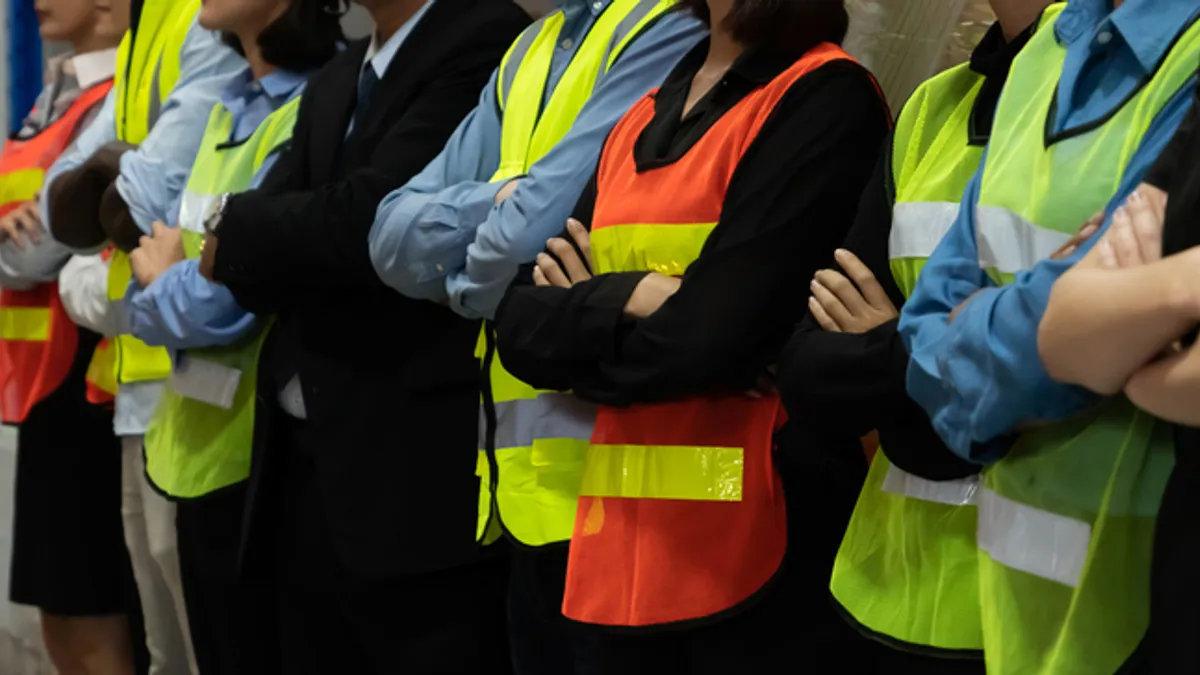The National Labor Relations Board’s decision to ban mandatory meetings in which employers express views about unionization during an organizing campaign presents numerous implications for companies.
The NLRB explained that such meetings — commonly known as captive-audience meetings — violate Section 8(a)(1) of the NLRA because they have a reasonable tendency to interfere with and coerce employees in the exercise of their rights. The board’s finding, in a case involving Amazon’s Staten Island, New York, facilities, overturns a 76-year-old precedent, Babcock & Wilcox, that had permitted employers to hold these mandatory meetings.
“Ensuring that workers can make a truly free choice about whether they want union representation is one of the fundamental goals of the National Labor Relations Act,” said NLRB Chairperson Lauren McFerran after the change was made. “Captive audience meetings — which give employers unfettered freedom to force their message about unionization on workers under threat of discipline or discharge — undermine this important goal.”
Ohio management-side employment attorney Jonathan Hyman, of Wickens Herzer Panza, noted that NLRB General Counsel Jennifer Abruzzo had been signaling for a couple of years that such a result was likely. But that didn’t make it any less troubling from his perspective.
“The board is treating employees like children,” Hyman told Legal Dive. “The union can say whatever it wants, but we don’t trust you to watch the employer’s propaganda. There are all-hands-on meetings all the time at work. Why should this be treated differently?”
In his dissent, Marvin Kaplan — the board’s lone Republican appointee — voiced a similar sentiment in noting that employers regularly hold mandatory meetings to train employees on a new work process or equipment, human resources issues, and safety standards. “Mandatory meetings on a wide variety of job-related issues are a common and accepted feature of the American workplace,” Kaplan said.
There’s a First Amendment concern, too, he said, since singling out employer meetings with anti-union speech impedes the free speech guarantee.
Why employers can’t stall for change
With Donald Trump set to return to the presidency on Jan. 20, there is little doubt that changes are coming at the NLRB. When President Biden took office in 2021, one of his first moves was to fire the board’s general counsel, Peter Robb, a Trump appointee.
It is widely expected that Trump will do something similar and dismiss Abruzzo, known for taking employee-friendly positions on a multitude of issues, including the legality of captive-audience meetings.
But companies that try to run out the clock and delay compliance with the Amazon ruling would be making a mistake, according to Los Angeles management-side attorney Mark Theodore, co-chair of Proskauer’s labor management and collective bargaining practice group.
“On a practical level companies should give it deference because the consequences of an unfair labor practice are severe,” said Theodore. “A single unfair labor practice during an election can give the union representation rights right then and there. You don’t want an easy, slam-dunk charge filed against you.”
While the Trump NLRB 2.0 is likely to reverse the ruling, Theodore said, changes to the case law will not happen overnight.
What’s more, there is a lot that goes along with any sort of challenge in time and legal fees, Hyman said.
“Do you want to be the six-figure test case?” Hyman said. “For my clients, which are mostly small and medium-sized businesses, the answer is no. It’s the law for now, and you’ve got to follow it until the board says otherwise.”
And that case is not coming on Jan. 21, 2025, nor will the labor board’s membership turn over immediately since members serve five-year terms. The NLRB currently has three Democratic members and one Republican member with one seat vacant.
McFerran’s term as chair expires on Dec. 16. But President Biden has nominated her to serve another term, along with a Republican management-side labor lawyer to fill the vacant seat. If the Senate confirms McFerran before the end of the year, it would mean the NLRB likely would continue to have a Democratic majority at least until August 2026, when the term expires for Democratic member David Prouty.
Compliance tips
The NLRB made clear in its decision that employers may continue to hold voluntary meetings for their workforce about unionization efforts. Theodore suggests that compliance need not be a massive headache for companies.
“It’s very easy to get your message across [against unionization] and do it on a voluntary basis,” said Theodore.
He advises telling all employees in writing that there will be a meeting about the union, and making clear that whether they choose to attend or not will be solely up to them.
“In my experience, all or almost all employees will still show up because it’s time they’re not working, and they want to understand what’s going on,” said Theodore.
For his part, Hyman recommended having employees who attend these meetings sign something that they were there voluntarily to prevent a future challenge. But he noted that employers must ensure they do not take attendance or record the meeting with views of the audience.
State action
While the NLRB’s Amazon decision marks a first-of-its-kind ruling for the board, state bans of captive-audience meetings have been a trend of late. In all, 11 states have passed or already enacted laws banning the practice with six of those coming in the past year: Alaska, which passed a ballot referendum earlier this month; California; Connecticut; Hawaii; Illinois; Maine; Minnesota; New York; Oregon; Vermont; and Washington.
Once the NLRB reverses course, these state laws could also be at risk, Theodore and Hyman said.
“You will see the NLRB step in and say these laws are preempted,” said Theodore. “They don’t like laws that impinge on their authority.”
But here too, they acknowledge that these challenges will take time. During the first Trump administration, the NLRB sued Oregon seeking to invalidate its captive audience ban, but the state law survived.






















